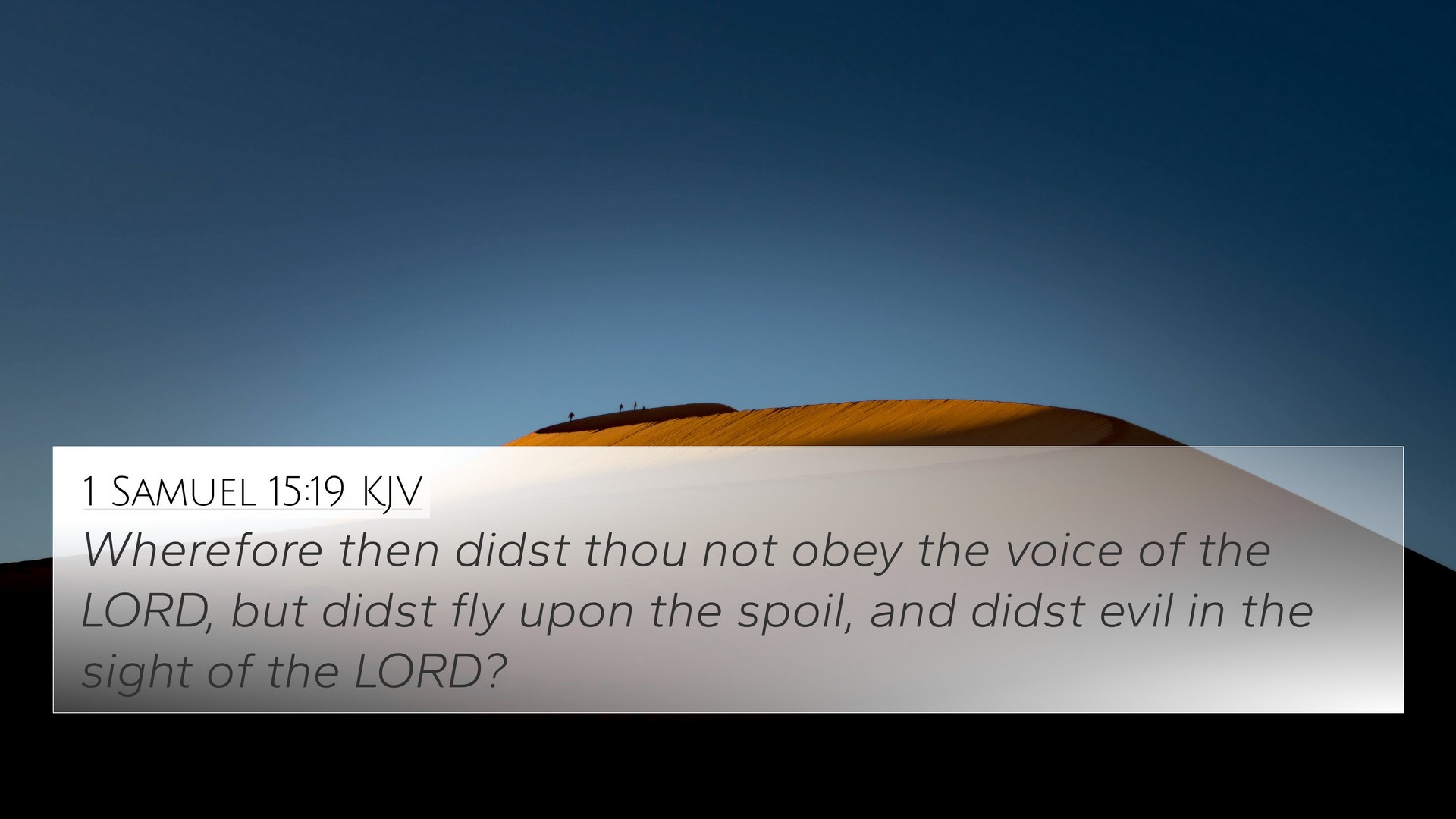Interpretation of 1 Samuel 15:19
Verse: 1 Samuel 15:19 – "Wherefore then didst thou not obey the voice of the LORD, but didst fly upon the spoil, and didst evil in the sight of the LORD?"
The account of 1 Samuel 15 details the Lord's command given to King Saul to completely destroy the Amalekites. Saul's disobedience, characterized by his choice to spare Agag, their king, and the best of the livestock, leads to this pivotal moment of confrontation. The verse encapsulates the themes of obedience and the serious consequences of sin against God’s explicit commands.
Meaning and Analysis
This verse can be explored through the lens of various commentaries which highlight several key ideas:
-
Disobedience:
According to Matthew Henry, the core issue is Saul’s failure to obey God's direct commands. This points to a broader theme throughout scripture regarding the expectation of obedience from God's people.
-
Recklessness in Action:
Albert Barnes explains Saul’s actions as an illustration of the dangers of allowing personal gain to overshadow compliance to divine instruction. This resonates with the scriptural principle that obedience is better than sacrifice (1 Samuel 15:22).
-
Righteousness vs. Evil:
Adam Clarke emphasizes the contrast between Saul’s actions and the divine standard of righteousness. The term "evil" points to the moral failings that result from disobedience, which tarnishes one's standing before God.
-
The Weight of Leadership:
Henry notes that as king, Saul’s disobedience not only affected him but also influenced the nation of Israel. This indicates how leaders are held to higher standards as their actions have wider repercussions.
-
God’s Perspective:
Barnes discusses how God perceives sin, emphasizing the importance of divine judgment in response to sin. Disobedience is interpreted as rebellion, thus inviting such judgment.
-
Consequences of Choices:
Clarke observes that Saul’s choice to disobey God's command led to immediate consequences, marking a turning point in his relationship with God and his ultimate loss of kingship.
-
The Nature of Sin:
Henry indicates that sin often presents itself in the guise of rationalization, just like Saul's justifications for sparing the best of the Amalekite belongings. This reflects how humanity can cloud their judgment when it conflicts with God's will.
Cross-References to 1 Samuel 15:19
- 1 Samuel 15:22-23: "And Samuel said, Hath the LORD as great delight in burnt offerings and sacrifices, as in obeying the voice of the LORD? Behold, to obey is better than sacrifice..."
- Deuteronomy 28:15: "But it shall come to pass, if thou wilt not hearken unto the voice of the LORD thy God..."
- Proverbs 21:2: "Every way of a man is right in his own eyes: but the LORD pondereth the hearts."
- James 1:22-24: "But be ye doers of the word, and not hearers only, deceiving your own selves..."
- Jeremiah 7:23: "But this thing commanded I them, saying, Obey my voice, and I will be your God, and ye shall be my people..."
- Romans 6:16: "Know ye not, that to whom ye yield yourselves servants to obey, his servants ye are to whom ye obey..."
- Hebrews 10:26: "For if we sin wilfully after that we have received the knowledge of the truth, there remaineth no more sacrifice for sins..."
Connecting Themes and Cross-References
This verse invites comparative study and thematic connections across the Scriptures:
- Understanding the nature of disobedience and rebellion as seen in Genesis 3:6 with Adam and Eve's choice.
- Analysis of King David’s later experiences, especially in Psalm 51, where he repents for his own transgressions.
- Linking the New Testament teachings of Jesus on obedience as seen in Matthew 7:21, emphasizing the importance of doing the will of God.
- Investigating the prophetic warnings in Isaiah 1:19-20 regarding the consequences of disobedience.
- Exploring Paul's admonitions in Galatians 6:7 reflecting on the inevitable consequences of our choices.
In summary, 1 Samuel 15:19 serves as a crucial reminder of the importance of obedience, the seriousness of our decisions in light of God’s commands, and the enduring impact of those decisions across both Testaments. Utilizing cross-references allows believers to grasp a holistic understanding of scriptural teachings on these vital themes.










